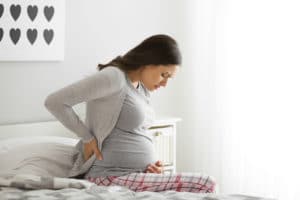Cramps in the legs occur primarily in the last third of pregnancy. They are truly not pleasant and can definitely affect the quality of life of affected women at times.
The closer the time to birth approaches and the more weight the expectant mother consequently carries, the greater the strain. Cramps in the legs are therefore usually an indication that your body is working very hard at the moment.
Table of contents
Muscle Cramps In The Legs? An Indication Of A High Load
A cramp in the calf is already not very pleasant if you are not pregnant. If you have a magnesium deficiency, it is conceivable that you will experience a calf cramp every now and then – especially after sports.
Calf cramps are certainly harmless, but the pain is quite distressing at times. Especially because they often occur at night, when the person comes to rest.
Cramps in the muscles during pregnancy, on the other hand, are experienced by many affected mothers as sometimes very distressing. When the pain occurs, it can last for several minutes or even several hours.
From The 2nd Trimester Onwards, The Muscle Cramps Or Calf Cramps Occur Relatively Frequently
Often, a lack of certain nutrients is the cause of cramps in the legs. Especially during pregnancy, the need for vitamins, minerals, trace elements and co. is particularly high.
After all, the expectant mother not only has to supply herself with nutrients but also the little lodger in her tummy. This takes strength and energy and can sometimes be very detrimental to the mother’s physical constitution.
Cramps In The Legs And Their Causes
When you feel cramps in your legs – this is often the case at night – it first helps to put your feet up. The causes of muscle cramps in the legs can be varied:
Cramps in the legs often result from overexertion. If your body has to carry too much weight, perhaps because you are overweight or have done strenuous work, cramps in the legs are sometimes the “order of the day”.
Pregnant women sometimes suffer from circulatory problems in the legs. Overuse can also be to blame for this. A pinched nerve is also sometimes a trigger for women to feel cramps in their legs.
Have you slept in an uncomfortable position during the night? Did you cross your legs? Something like that can definitely cause muscle cramps or calf cramps.
Magnesium deficiency or also a deficit of calcium can cause calf cramps or muscle cramps. Electrolyte imbalances are also considered a frequent trigger for calf cramps and muscle spasms.
Taking medications can cause leg cramps to develop. In rare cases it is possible that an inflammation of the veins triggers cramps in the legs.
Especially during pregnancy, hormonal factors play an important role when it comes to cramps in the legs.
What Are Calf Cramps? Where Do Muscle Cramps In The Legs Come From?
According to experts, calf cramps or muscle spasms often involve a disturbance in the transmission of stimuli from certain muscle segments to the brain.
The factors influencing this can be, among others, certain minerals. Thus, muscle cramps or calf cramps are often the typical accompanying symptoms of pregnancy.
Expectant mothers experience cramps in the legs, especially in the calf, feet, thighs, or buttock muscles. Cramps in the legs or muscle spasms or calf cramps are also called spasms. They are painful and sudden tensions in the muscle parts.
Usually the cramps in the legs last only a short time. However, if – for whatever reason – cramps in the legs occur more frequently, it is possible that sooner or later they will develop into painful conditions that can last for several hours.
Cramps In The Legs Occur Randomly
Cramps in the legs can occur at any time of the day or night. There is often no “advance warning.” Expectant mothers feel the calf cramps or muscle spasms very strongly, especially at night or during periods of rest.
Usually they are so intense that they even wake up from them. Around the 20th SSW, the frequency of cramps in the legs increases dramatically.
What You Can Do Against Cramps In The Legs
As soon as you feel the cramps in your legs, you should perform a kneading massage as a first-aid measure. Although you will not feel any significant relief or pain relief at first, a massage is very beneficial for the affected muscle area. This is true even if the pain from the calf cramp becomes more severe.
Massaging the affected area has the advantage of restoring blood flow to the sore muscle area. Afterwards, it usually takes only a few minutes for the cramps in the legs to subside.
In connection with the kneading massage, heat is also good for your body. Whether by means of a hot water bottle, a heating pad, or cherry pit cushion – place the heat source on the cramping muscle and be patient for a few minutes. The heat stimulates blood circulation, has a relaxing effect and loosens the muscles.
A Strong Appearance Against Cramps In The Legs
Many expectant mothers who fear the increasing pain of massaging their calf cramps or muscle spasms can alternatively proceed as follows: It can often help to step firmly on the mattress of the bed with the affected foot. The resulting counterpressure can relieve the calf cramp pain within a few seconds.
Equally effective is pressing the sole of your foot against the end of the bed while trying to pull your toes in the direction of your body. Even if it is not easy to keep the tension in this position – just try it.
Sporting Activity Only Harms The One Who Does Not Do It
Experience has shown that stretching exercises while you feel the cramps in your legs provide relief relatively quickly. In order to do everything correctly, you should stretch out the painful leg in a lying position and pull the toes towards you.
If this does not help, get out of bed and walk around the bedroom. In the meantime, you should not put too much weight on the cramping leg. The standing position already has a certain stretching effect, and the calf cramp will quickly go away.
Hot-cold showers are not particularly recommended during pregnancy. But nevertheless, alternating showers literally work wonders when you have cramps in your legs. It is important that the water temperature is only as hot or as cold as you personally find comfortable.
This Is How You Can Prevent Cramps In Your Legs
A balanced diet is elementary, especially during pregnancy. Not only your body needs high-quality nutrients to live, but especially the baby in your belly. Because the need for nutrients is very high during pregnancy, you should pay more attention to a healthy diet.
If you are unable to do this continuously due to occasional stressful periods in your life, you should consider taking nutritional supplements.
Seek the support of a nutritionist or ask your midwife for advice. In the course of this, you will find out where there may be a nutrient deficit in your diet – and how you can compensate for it.
In general, whole grains, nuts, dairy products, cabbage and other vegetables, and fresh fish should be part of a balanced diet. Pumpkin and sunflower seeds, as well as almonds and nuts, are rich in magnesium and help prevent leg cramps.
No less important than a healthy diet are regular rest breaks. Put your legs up as often as you have the opportunity to do so. In this way, the blood does not accumulate in the strained veins, but the muscles are relaxed and the vessels are relieved. In addition, treat yourself to regular foot reflexology massages.
This can also prevent cramps in the muscles – and you also benefit from a real feel-good experience.
Conclusion
Calf cramps or muscle spasms are indeed very painful and also annoying. But they are not associated with long-term health problems for the expectant mother. Cramps in the legs are also not harmful to the child in the womb.
So don’t worry about them. Instead, try to prevent cramps and make every effort to eat healthy and do something good for your body whenever possible.
Sources
https://www.windeln.de/magazin/schwangerschaft/gesundheit/muskelkraempfe-in-der-schwangerschaft.html












1 thought on “Cramps In The Legs: A Warning Signal From Your Body”